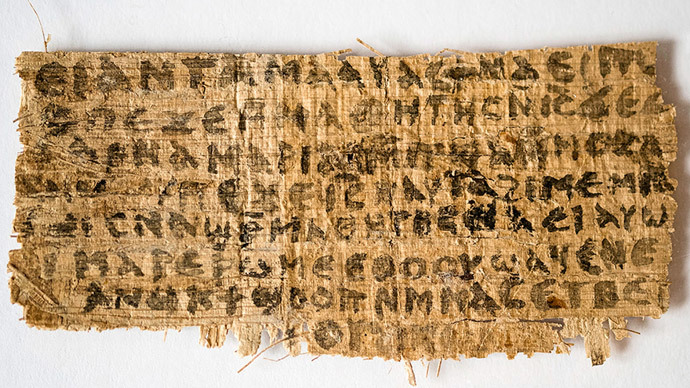‘Jesus’ wife’ papyrus not a modern forgery, scientific tests say

Scientists now say that an antiquated piece of papyrus containing an excerpt concerning the alleged wife of Jesus Christ is not in fact a forgery.
According to the results of a carbon dating test just now released, the so-called “Gospel of Jesus’s Wife” unveiled at a conference in Rome a year-and-a-half-ago could have originated as far back as the 700s, shattering allegations that the fragment of paper had been produced more recently by fraudsters.
Translated to English, the document is adorned with the words “Jesus said to them, ‘My wife...’” and “she will be able to be my disciple” — two fragments of phrases that not only suggest that the founder of Christianity may have been married, but that role of women in the church may have been significantly different over a thousand years ago.
Karen L. King, a professor at Harvard University who discovered the text, originally thought that the papyrus was from the fourth century. But while the latest rounds of testing date the document to be several hundred years newer than previously assumed, it also dismisses concerns surrounding the actual authenticity of the evidence.
The Boston Globe reported on Thursday this week that King’s document was originally dismissed as a fake by both academic peers and the Vatican’s official newspaper, but carbon-dating suggests the ink used on the papyrus is from eighth century Egypt.
“I’m basically hoping that we can move past the issue of forgery to questions about the significance of this fragment for the history of Christianity, for thinking about questions like, ‘Why does Jesus being married, or not, even matter? Why is it that people had such an incredible reaction to this?’ ” she said in an interview with the paper.
“Now when I come back and read the fragment, it seems the major issue being talked about was that Jesus was affirming that wives and mothers can be his disciples,” King said.
But ahead of the results of this latest tests being revealed, King too had her doubts. “I took very seriously the comments of such a wide range of people that it might be a forgery,” she added to the New York Times, who reported that King now says she is very confident that the document is in fact genuine.
“When you have all the evidence pointing in one direction, it doesn’t make it 100 percent, but history is not a place where 100 percent is a common thing,” Dr. King told the Times.
As for others, however, skeptics still have their doubts.
“Nothing is going to change my mind,” Brown University Egyptologist Leo Depuydt told the Boston Globe this week. “As a forgery, it is bad to the point of being farcical or fobbish. . . I don’t buy the argument that this is sophisticated. I think it could be done in an afternoon by an undergraduate student.”
The document is full of “gross grammatical errors,” he added to the Times, “seems ripe for a Monty Python sketch” and could have been authored with a homemade ink substitute that “an undergraduate student with one semester of Coptic” could have accomplished. A rebuttal from Depuydt will run alongside Dr. King’s peer-reviewed paper when it is published by the Harvard Theological Review this week.
According to the Globe, two rounds of carbon-dating testing were done on the document—first by the University of Arizona Accelerator Mass Spectrometry Laboratory and then Noreen Tuross of Harvard.
“I haven’t seen any argument that I find at all compelling that would indicate that it’s not genuine, it’s not ancient,”Roger Bagnall, director of New York University’s Institute for the Study of the Ancient World, added to the Globe.














